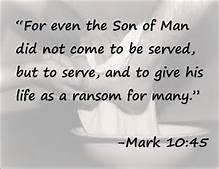“O Come, Emmanuel”

Luke 1:26-38 (1:31) – December 2, 2018
Have you noticed when you saw or heard your first Christmas commercial this year? On television, or on the radio? Or, perhaps it’s the first piped-in Christmas music at the store or at the coffee shop. Do you remember where you were? This expectation we go through every year; we pause, we watch the commercials, we hear in the music, we see in the displays of holiday lights and lighted figures outside of our neighbors’ houses.
These four weeks of Advent are weeks of preparation, of anticipation, of expectation. All these things are announcements of an impending arrival. Little reminders of the anticipation of the narrative from the first chapter in Luke. Ours is a fraction of the expectation that Mary had, beginning with the announcement from the angel. The teenage Mary had the angel Gabriel burst in on her, unannounced, giving her the very first Christmas commercial.
The anticipation we feel today is only a shadow of that we find in the Bible. I suspect, the teenage Mary was surprised out of her sandals by this unexpected visitor. Mary is told to expect the birth of the Son of the Most High.
If we go back several centuries, to the time of the prophet Isaiah, we notice the prophet writing about a young woman bearing a child, too. In the Septuagint, the Greek translation of the Hebrew Scriptures, Isaiah 7:14 reads “a virgin will conceive and give birth to a son.” The Gospel of Luke shows this prophecy being fulfilled. But—not quite yet. Mary needs to go through a nine-month waiting period, a period of anticipation, expectation, and preparation.
As one commentator says, “Let’s be honest. Perplexity is exactly our response when the Lord shows up. To me? Why me? Why now? I think we underestimate the impact of what it means to know that God is actually around. Here. With us. Doesn’t God have better things to do? Bigger things to take care of? More major issues to maintain besides me?” [1]
Mary has a problem. She is not only a virgin (which the angel tells her not to worry about). However, she thinks she is merely a common, ordinary, every-day-type young woman. There is nothing special or extraordinary about her! It is “only after expressing her wonder and dismay, and then hearing again Gabriel’s affirmation and promise, does she manage to summon the courage to believe that God is indeed favoring Mary by working in her and through her for the health of the world.” [2]
This week is the first week of Advent, and we are going to focus on songs during these weeks. The Advent and Christmas seasons have marvelous carols, hymns and songs written during a number of centuries. This week, appropriately, we highlight the Advent carol “O Come, O Come, Emmanuel.” An excerpt from a fine article on this carol is found in your bulletin.
If you look at the article, notice several things. This is one of the oldest carols we have in our hymnals today. Christians have been singing it for over 1000 years. Originally written in Latin, it was translated into English by the scholar and priest John Mason Neale in the 1800’s. The translation of this hymn lets us know how much theology was written into the original lyrics. Each verse mentions a number of biblical and theological references.
You know what this ancient Latin hymn reminds me of? Young Mary. Eileen did not read Mary’s song from the first chapter of Luke, the Magnificat, but Mary does exactly that—after the angel leaves her, she breaks into song, and praises God. Not only that, she must have been biblically knowledgeable, because her song is chock full of biblical and theological references.
We know Mary was an introspective young woman, thoughtful and contemplative, since Dr. Luke tells us so in chapters 1 and 2. Does it surprise us that she knew a great deal about the Hebrew Scriptures, as we can tell from reading her song, her response to God?
Quoting from this wonderful song, the Magnificat:
“My soul glorifies the Lord 47 and my spirit rejoices in God my Savior,
48 for he has been mindful of the humble state of his servant.
From now on all generations will call me blessed,
49 for the Mighty One has done great things for me—holy is his name.
50 His mercy extends to those who fear him, from generation to generation.
51 He has performed mighty deeds with his arm; he has scattered those who are proud in their inmost thoughts. 52 He has brought down rulers from their thrones but has lifted up the humble.
53 He has filled the hungry with good things but has sent the rich away empty.
54 He has helped his servant Israel, remembering to be merciful
55 to Abraham and his descendants forever, just as he promised our ancestors.”
A modern setting of this song of Mary is the Canticle of the Turning, by Rory Cooney. I keep reminding myself not to get political in my weekly sermons—except when the words of the Scripture we read from the Lectionary are clearly lifting up some direct calling from God. Through Mary’s words, we are called to stand up in this neighborhood, this country, this world, and stand with the humble, the hungry, with those who fear God. We are called to stand against the proud, the rich, and the rulers.
In the Canticle of the Turning, this new retelling of Mary’s song is, indeed, about the birth of a baby. It also talks about how this birth turns a family upside down. Yet, this whole event—the birth of the Son of the Most High—is about God turning the world around. It is through God’s Son, Jesus, God welcomes us all. Not just welcoming the rich and privileged, but everyone, male, female, rich, poor, slave, free, whatever difference one person has from another. All means Jesus welcomes everyone. No matter what, no matter who.
Perhaps God did an extraordinary thing through Mary—just as the angel said—to show the world that through God all things are possible. Just as it was for the prophets, so it was with Mary, and so it is with us. May we all respond like Mary—“Here am I, the servant of the Lord; let it be with me according to Your word.”
[1] http://www.workingpreacher.org/craft.aspx?post=3462
Advent as a Way of Life, Karoline Lewis, Working Preacher, 2014
[2] http://www.workingpreacher.org/craft.aspx?post=1611
“Favored Ones,” David Lose, Dear Working Preacher, 2011.
(Suggestion: visit me at my regular blog for 2018: matterofprayer: A Year of Everyday Prayers. #PursuePEACE – and my other blog, A Year of Being Kind . Thanks!



